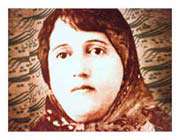Parvin Etesami’s Divan

I had put my twenties behind and still wished to publish the collection of my poems. It was such a strange time those days and the condition of we the girls and women was so strange and unpleasant. I remember that despite the fact that my father was a learned and scholarly man and an able writer and a skillful poet, those days he didn't allow the poems of his daughter – me – to be published in the form of a divan. Probably, he was right, for after all he was more experienced than me and knew his time better than me. When his friends had several times urged him to allow the publication of my poems in the form of a book, he had said: “If the divan of my daughter is published, many people will think that she is looking for a husband and is publicizing herself through her poems.” My innocent father wasn't to blame. The prevailing atmosphere of the society was such those days. Those days, a poetess should have been a courageous man to be able to enter the field of poetry, literature and art. If my father weren't Yousuf E’tesam-ul-Mulk and if I hadn’t been born in a family who were patrons of poetry and literature, and if there weren't a number of books, writers and poets around me, probably, no poem of mine would have been printed and I wasn't Parvin E’tesami now, but I was Rakhshandeh E’tesami. Undoubtedly, I would have perished away in the midway. Or, possibly, after getting married, my husband would oppose my artistic-literary activities or I would indulge in taking care of my husband and children to the extent that I would totally forget poetry and literature; just like many poetesses whose talent perished in the midway and didn't blossom. But I tried to struggle against all those problems.
Translated by: Sadroddin Musawi